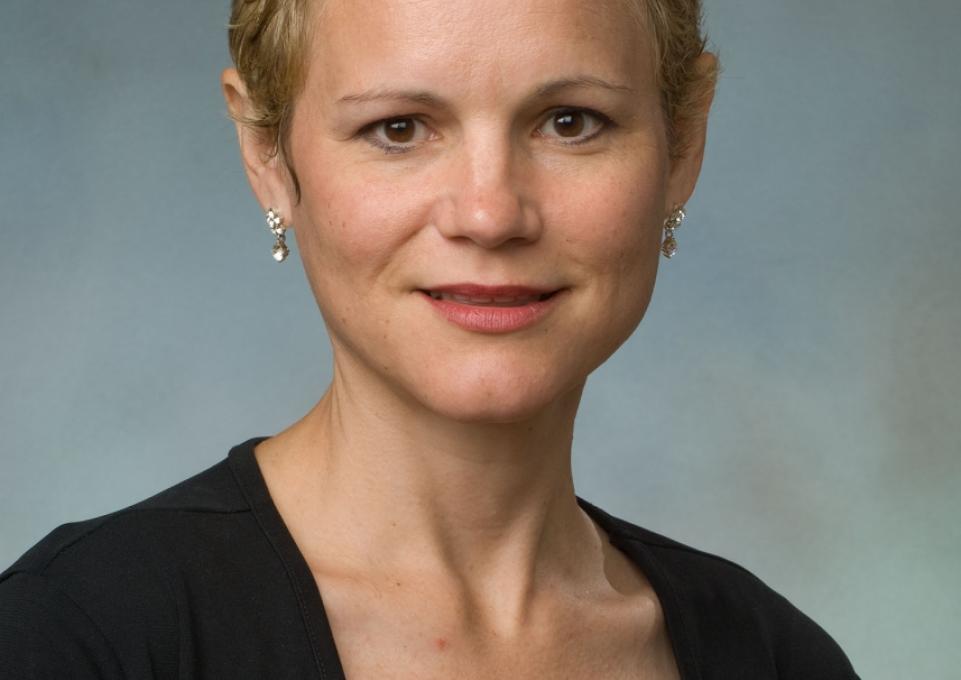
Kim Chinquee, associate professor of English, possesses the lean, lithe physique of a runner and the fashion sense of an artist. Since discovering flash fiction in graduate school in the late 1990s, she has mastered the lean genre of writing, one that relies on few words (typically 700 or fewer) to relay powerful emotions.
Chinquee expertly conveys chilling tales of failed relationships, teen angst, and child abuse in under 500 words. Some of her stories are told in just one paragraph; others run a couple of pages.
A recipient of both the Pushcart and Henfield prizes, she’s had short fiction and prose poetry published in numerous literary journals and in three collections Pistol (Ravenna Press, 2012), Pretty (White Pine Press, 2010), and Oh Baby (Ravenna Press, 2008).
Most recently, a longer short story “The Meat Place,” appeared in the spring 2014 issue of
Ploughshares, an award-winning literary magazine based at Emerson College in Boston, Massachusetts.
"What I love about the flash fiction genre is the focus on sensory details. It's a different experience for readers; they have to fill in the gaps and learn to read in a different way. Since I started writing flash fiction, it's made me a better writer and novelist," said Chinquee, who joined the Buffalo State faculty in 2008. "It's about sprinting versus long-distance running. You are using different muscles, but still conditioning yourself."
Her passion for writing parallels her love of running. They both require discipline, isolation, and the determination to push through barriers and making adjustments. After running marathons for years, Chinquee suffered an injury and was encouraged to start cross-training. In the summer of 2013, she completed her first triathlon and qualified to compete in a national triathlon for her age group in August in Milwaukee.
Chinquee said flash fiction doesn’t require as much emotional energy as longer pieces. That being said she’s now pouring energy into a novel based upon her experience at the 2013 Boston Marathon in which a terrorist bombing killed three people and injured 264 others.
She went to Boston to write about the race from a literary perspective for The Believer magazine. When the bombs exploded near the finish line, Chinquee was sitting in a nearby restaurant. The experience was too traumatizing to condense into an essay right away. Months later, her agent suggested she develop the experience into a novel, which she now has the distance and perspective to tackle.
She balances her dedication to physical training and writing with teaching a full slate of writing and literature courses and serving as editor of Buffalo State’s Elm Leaves Journal and associate editor of the online literary magazine. New World Writing.
Chinquee didn’t always know she wanted to write. After growing up on a dairy farm in Krakow, Wisconsin, she joined the Air Force where she served as a medical technologist. She also worked in this capacity for hospitals in Wisconsin and Minnesota before earning a bachelor’s degree in English. When she took a creative writing course at the University of Wisconsin, Green Bay, Chinquee realized this was the kind of writing she wanted to pursue.
She completed a master’s in creative writing from the University of Southern Mississippi and a master of fine arts from the University of Illinois where she helped start the literary journal Ninth Letter in 2002. In the ensuing years, it has flourished and won awards.
Chinquee invests that same devotion in Elm Leaves, the college’s biannual journal of short stories, poetry, and essays. Students in her fall Literary Publishing course helped select the featured works and handled the editing and layout for the winter issue, which marked the first print edition since 2011.
Like the running and triathlon communities to which Chinquee has become involved—she is a member of the Buffalo Marathon Planning Committee—she has discovered strong literary communities in Buffalo as well as worldwide through online writing sites.
"I once thought as a writer you had to isolate yourself,” she said. “While you have to set aside time to be alone and write, there are many opportunities to share you work, get feedback, and support. When I show my students the different things I am doing and involved with, I see their eyes light up.”
